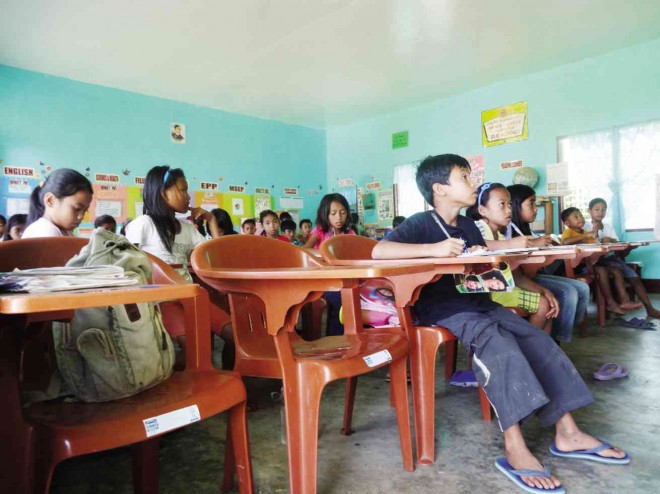Kids born in war find way to school

THE CLASS that Poypoy Enggay is attending in a village in Parang, Maguindanao province. NASH MAULANA
UPI, Maguindanao—Marlyn Enggay was two months pregnant when her family fled the final wave of the all-out war between government forces and the Moro Islamic Liberation Front (MILF) in Barira, Matanog and parts of Buldon towns in Maguindanao province in May 2000.
Months later, she gave birth to her youngest, Poypoy, while seeking refuge from place to place with husband Dominador and four small children in tow.
Shooting wars, poverty and the long period of wait in postconflict clearing and rehabilitation for a safe return had taken much of the children’s time off school.
Reporters, who covered the biggest war the government has ever waged against the MILF, had visited a household of Good Samaritans in Parang, Maguindanao, while hosting simple ceremonies for the baptism of infants born in evacuation camps from 2000 to 2001. Poypoy was one of them.
Poypoy, now 13, found his way to a Grade 2 class in the uphill village of Kabakaba, where rocky, slippery roads are often impassable to vehicles. He was teary-eyed in this interview, recalling, as his parents told him, his family’s difficulties and of him missing much of his life in school.
The family of Marlyn, an Iranun Muslim, and Dominador, a Teduray native of Upi, was staying with Marlyn’s mother in Barangay Malagapas in Barira when the war broke out in 2000. The first casualty was the community school attended by the couple’s eldest child, who has since been out of school. None of the children in the village have returned to school.
Some, like Poypoy, have enrolled in elementary school, more than a decade after the war.
Their community’s old madrasah (Arabic for elementary school) in Barangay Malagapas has since closed down. Local educators blamed the closure on the lack of teachers.
The family’s ordeal of evacuation took all of 13 years. Two children have turned to working on farms and two others are working as household helpers in Parang and Cotabato City.
Poypoy said it was his sister, Merlyn, learning from her own lesson as a barely schooled household help, who decided to send him to relatives in Upi to be enrolled, though late, at Kabakaba Elementary School.
Education Secretary Jamar Kulayan, of the Autonomous Region in Muslim Mindanao (ARMM), said children of war suffering the same fate as Poypoy’s and his siblings’ could still be in appropriate school levels, through the Alternative Learning System (ALS) or by taking practical tests in the government’s acceleration program.
From what she earns as a house help, Merlyn spends for Poypoy’s expenses while Poypoy is with relatives. But most of the time, he has to walk 2 kilometers daily to and from school to save money, or on days when he doesn’t have anything to spend even for snacks, his teacher Jenelyn Betta said.
Betta said Poypoy was faring well in class and seemed to be “bright and happy.”
The teacher said the Kabakaba community helped construct the school building in partnership with World Bank, through the ARMM Social Fund Project. The new school building helped ease congestion in currently existing dilapidated classrooms that have barely enough armchairs for students.
A space in the building, she said, houses a computer room with seven units of desktop computers and other devices sent by Kulayan and ARMM Gov. Mujiv Hataman.
Betta is handling 51 students in the classroom with sufficient number of armchairs, enough to accommodate her pupils on a one-to-one ratio.
But on the average, each student would have to walk 2.7 kilometers to and from school.
Kabakaba Barangay Councilor Rodrigo Andres said students were now better off than those during his time, when students had to walk on muddy roads where the main mode of transportation was horses.
Hataman said Poypoy’s story formed part of the Bangsamoro history, with armed conflict being the primary cause of the region’s low literacy rate, particularly among females.
This, Hataman said, could be solved only through peace. He called on lawmakers and others to help Muslim Mindanao achieve this by throwing their support for the peace agreement recently signed by the government and MILF.














